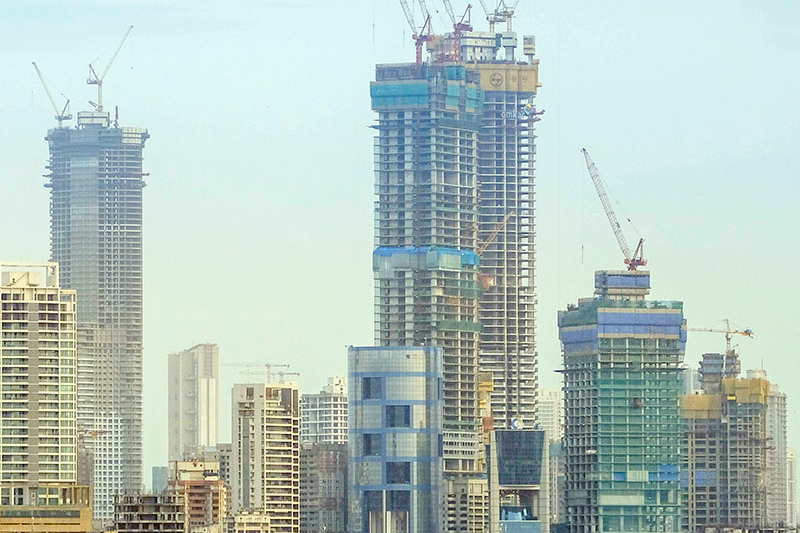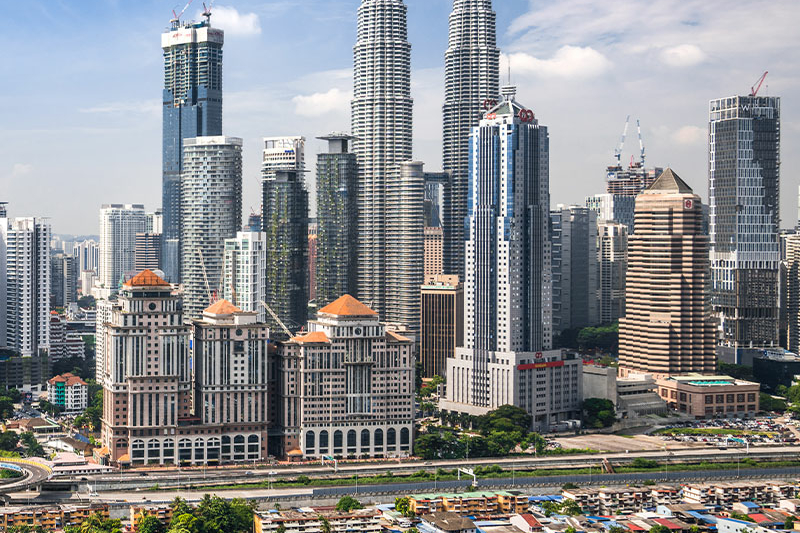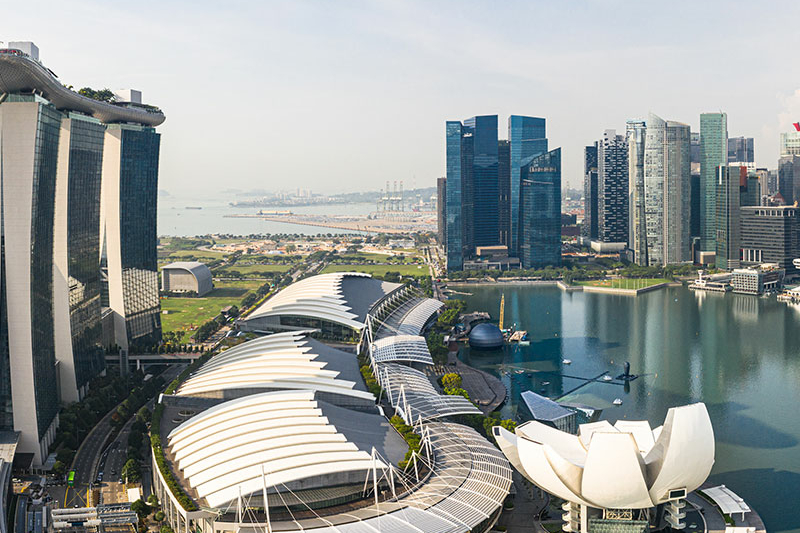Australia
Australia is a highly advanced mixed economy, but investors – often drawn to the country's economic stability and resilience – should be aware of certain clauses that typically appear in construction contracts.

The construction sector in Asia-Pacific is set for considerable growth, although that comes with challenges. In any largescale construction project, myriad risks exist to cause disruptions and delays, but there are best practices for mitigating these risks and resolving disputes.
The International construction industry, sensitive though it is to global economic cycles, has proven itself remarkably resilient in the face of the pandemic. In much of the developing world, including countries in the Asia-Pacific region, it also holds the key to economic recovery due to its potential for job creation. Coupled with a drive toward sustainability and digital transformation, the sector is set for considerable growth in the next few years. Some market observers suggest that the construction industry in Asia-Pacific might reach US$312.67 billion by 2024.
Governments across Asia-Pacific are looking to infrastructure to help stimulate growth as the region begins to return to some form of normalcy post-COVID-19. Encouraged by this government focus, investors are turning to view Asia-Pacific as a land of opportunity. But with rapid growth comes challenges. Construction projects around the world rely heavily on long supply chains: equipment, material and labor. A disruption to any link in that chain can result in delay and increased costs, and the way parties approach risk allocation and mitigation can have significant financial implications.
As construction projects around the world were interrupted or suspended against the backdrop of the pandemic, project owners, developers and contractors have started to look at their contractual terms more closely. Force majeure is not the only option for obtaining relief, often other—and more appropriate—avenues exist that merit exploring at an early stage. Savvy market participants will proceed with great caution and will take steps to mitigate risk, avoid disputes and ensure the best possible outcome through settlement or arbitration should disputes arise.
Australia is a highly advanced mixed economy, but investors – often drawn to the country's economic stability and resilience – should be aware of certain clauses that typically appear in construction contracts.

In recent years, the construction industry in India has emerged as an attractive destination for foreign investment. To support this heightened interest, the government of India has enacted an attractive foreign direct investment policy.

The construction industry in Indonesia has long been considered the backbone of the country's economic and social development, and regulations are being continuously amended to ease complexity and expedite processes for businesses and foreign investors.

With its strategic location and significant natural resources, Malaysia is an internationally recognized investment-friendly jurisdiction with a significant construction industry. Malaysian law offers procedural safeguards and mechanisms for dispute resolution to facilitate, for example, regular and timely payment under construction contracts.

The Philippines construction industry is expected to grow with the introduction of the "Build, Build, Build" initiative and the amendment of a number of laws that would loosen restrictions on foreign investment.

With a significant and coherent body of case law on construction disputes, Singapore is a hub for resolving many construction disputes across the Asia-Pacific region.

Changes in the construction law and favorable government policy continue to spur Vietnam's construction industry.


Changes in the construction law and favorable government policy continue to spur Vietnam's construction industry.
Stay current on your favorite topics
2015
Vietnamese Courts recognized court precedents as a source of law as of 2015
Vietnam is the third-largest country in Southeast Asia. Due to favorable government policy and an abundance of natural resources, it is increasingly attractive to both domestic and foreign investors. Vietnam is strategically located in the heart of the Asia-Pacific region and is committed to global trade integration and trade liberalization. This is evidenced by its participation in APEC (which it hosted in 2017), the ASEAN Free Trade Area, the WTO and a growing network of free trade agreements, including the ASEAN-Australia-New Zealand Free Trade Agreement, and its trade agreement with the European Union.
Vietnam is a civil law country, modeled on the French and Soviet systems until the late 1980s.5 From 2015, the Vietnamese Courts recognized court precedents as a source of law, which is likely to give greater certainty and stability to the legal regime in Vietnam.
Vietnamese law explicitly provides that investors shall be treated equally in all economic sectors, as between domestic investment and foreign investment, and that industry "shall encourage and create favorable conditions for investment activities."7 Different forms of foreign investment are subject to different licensing processes. Foreign investors or enterprises that wish to establish a new enterprise to implement an investment project must register the project to receive an investment registration certificate.8
Similarly, every enterprise must receive an enterprise registration certificate before beginning operations, which is issued by the provincial-level State Business Registration Authority. An "enterprise" is defined broadly as an "organization having its own name, having assets and a transaction office, and registered for establishment in accordance with law for trading purposes."9
US$57.5
billionDemand for construction in Vietnam in 2018
Freedom to contract constitutes one of the fundamental principles of Vietnamese contract law. Parties are generally free to agree on the specific contents and clauses of their contracts. In fact, a contract does not have to be in writing, except where required by a specific law.10
Two key types of clauses that are often the subject of significant negotiations are of particular interest:
Penalty clauses fix, in advance and independently of the real loss suffered, the amount of damages due by one party if it breaches a contractual obligation.
Penalty clauses are valid under Article 300 of the Commercial Law, and Article 146 of the 2014 Construction Law. They are triggered if: (1) there is a breach of contract, and (2) the penalty for breach is stated in the contract. Parties can agree on the level of penalty for breach, unless otherwise prescribed by law. In particular, the level of penalty may be subject to a limitation of 8 percent of the contract value under the Commercial Law, or 12 percent of the contract value under the 2014 Construction Law.11
Liquidated damages clauses are similar in that they allow the parties to agree in advance on a fixed sum to be paid should the contract be breached. However, they are meant to be a reasonable and proportionate estimation of the damages payable in case of breach. If liquidated damages are disproportionate, they may be unenforceable.
Although liquidated damages are often included in construction contracts as a remedy for delay, they are not expressly authorized under Vietnamese law. Pursuant to Article 304 of the Commercial Law, the party claiming damages bears the burden of proving the loss and its amount. Therefore, the efficacy of liquidated damages clauses under Vietnamese law is questionable.12
Exclusion of liability clauses seek to completely exclude a contracting party's liability. In contrast, limitation of liability clauses seek to limit contractual liability. Such clauses will generally be enforceable under Vietnamese law, except in specific circumstances. Parties should take certain steps ensure that these clauses are enforceable, as outlined below.
The Commercial Law recognizes exemption of liability clauses agreed upon by the parties, without setting out particular conditions for their validity.13 Parties to a contract should therefore ensure that they clearly agree upon the relevant contractual modalities.
Generally, a judge or arbitrator will not vary exemptions of liability agreed upon by the parties to a contract except in specific circumstances. In particular, (1) in arbitration, arbitrators must respect the parties' agreement as long as the agreement neither breaches any prohibitions nor contravenes "social ethics,"14 and (2) in civil proceedings, the court's function is limited to deciding the dispute as set out in the relevant claim or petition. As a result, if the relevant exemption of liability clause does not contravene any "social ethic" or breach any prohibition, then an arbitrator or judge will generally not have discretion to vary that exemption of liability clause.
However, in certain circumstances a court might vary an exclusion clause. For example, a court may exercise its discretion to terminate or revise a contractual clause if requested by a party based on hardship. A party may also seek termination where the circumstances of the contract change substantially.15
Circumstances will be deemed to have changed substantially when:
Vietnamese government regulations on construction provide for various contractual mechanisms that have the effect of helping a contractor secure adequate cash flow.
Under both Decree 37/201517 and Circular 30/2016,18 parties can agree on advances that correspond to an amount of money offered in advance by the employer to the contractor for necessary preparations before implementation of the tasks under the contract. Details of the advances, including the level, date and terms of recovery, are determined by the parties. The sums paid under advances are deducted from the contract price at the date of payment. Although such agreement is not mandatory, both Decree 37/2015 and Circular 30/2016 include detailed guidelines to assist parties.
Under Vietnamese law, the starting point for termination is that a breach does not automatically allow a party to terminate a contract
In certain circumstances, Vietnamese law provides for the ability of a party to terminate a contract for breach. It also provides for the cancellation of contracts in certain circumstances.
Termination and cancellation are governed by the Civil Code.19 The Civil Code sets out the circumstances where a contractual relationship may be deemed to be terminated or cancelled. This includes where termination may occur by agreement, including where a contract provides for termination upon the occurrence of certain events.20 Even if the contract contains no termination or cancellation provisions, the Civil Code provisions on termination will automatically apply.
Under Vietnamese law, the starting point for termination is that a breach does not automatically allow a party to terminate a contract. If the parties have not agreed on the circumstances in which the contract may be terminated, then under Article 428 of the 2015 Civil Code, unilateral termination can only occur if the other party "violates its obligations seriously." If one party unilaterally purports to terminate a contract without basis, then it will be in breach.
However, if a contract clearly and unambiguously provides for events under which one party can terminate the contract, and such events have occurred, the contract can be terminated. For this reason, it is recommended that termination clauses be carefully drafted so as to expressly outline the circumstances in which a party may terminate.
Moreover, a substantial or serious breach of a contract may also give rise to a right to unilaterally terminate that contract (either if the parties agree so, or if otherwise prescribed by law).21 A serious breach is defined as a failure by a party to correctly fulfill its obligations, so that the other party is unable to achieve the purpose of entering into the contract.22
Termination of a contract results in that contract becoming null and void from the time the other party receives a notice of termination. The terminating party should receive compensation for the damage caused by the improper performance of the other party.23 In construction contracts, the contractor is entitled to terminate the contract if the principal does not perform its payment obligations in the time limit agreed by the parties.24
The Civil Code also provides for the cancellation of contracts in certain circumstances. If a contract is cancelled (for an inability to perform, for example) then it ceases to be valid from the time of its conclusion. This means that parties are not required to perform the obligations already agreed upon, except the agreements on penalty for breach, compensation for damage and dispute settlement. Late performance of a contractual obligation may also constitute a ground for cancellation of the contract.25
Most foreign investment contracts contain a dispute resolution clause specifying a preferred seat of arbitration in a country that is party to the New York Convention
Under Vietnamese law, parties are free to agree to contractual provisions dealing with unforeseen circumstances. For example, parties can agree to a hardship or force majeure clause.
If a contract does not provide otherwise, the parties may also claim force majeure under Vietnamese law. Under Article 161.1 of the old Vietnamese Civil Code and Article 156 of the new Civil Code, an event of force majeure is defined as circumstances that occur objectively and unpredictably and cannot be overcome despite all necessary measures having been taken (for example, a pandemic such as COVID-19 and consequences of the outbreak, war, strike or riot, or a natural disaster such as an earthquake or flood).
If a force majeure event occurs, the parties may be relieved from their liability for losses or damages, or performing their obligations.26 Under the Commercial Law, for the force majeure event to qualify for an exemption of liability, the defaulting party must immediately notify the other party in writing of the force majeure event and its possible consequences. It must also notify the other party when the force majeure event ends.27
In practice, construction contracts generally define a list of force majeure events. These clauses are valid under the principle of freedom of contract recognized under Vietnamese law. In the case of force majeure, employers or contractors are relieved from their liability for losses or delays in work.28
The new Civil Code introduced the concept of change of circumstances, which allows for renegotiation of the contract and, if that renegotiation fails, for termination of the contract by the court. However, the court may only amend the contract if the contract's termination would cause greater damage than the cost to perform the modified contract.29
Termination will only be justified if:
Jan 1,
2011The Law on Commercial Arbitration came into effect on January 1, 2011
There are a number of dispute resolution mechanisms available to foreign investors in Vietnam. These include litigation, arbitration and mediation.
Dispute Adjudication Boards (DAB) are often used when a construction dispute arises. The use of a DAB is stipulated in the FIDIC forms, and the Vietnamese government encourages parties involved in construction projects to use the FIDIC international standard conditions of contracts. Use of a DAB would come before mediation or arbitration, and is a chance to achieve settlement before referring the dispute to mediation or arbitration.
1 World Bank, https://data.worldbank.org/indicator/SP.POP.TOTL?locations=VN.
2 World Bank, https://data.worldbank.org/indicator/NY.GDP.MKTP.CD?locations=VN.
3 World Bank, 'World Development Indicators: Structure of Output', available at: <http://wdi.worldbank.org/table/4.2>.
4 The construction industry's output value is expected increase from USD 57.5 billion in 2018 to USD 84 billion in 2023. Growth during 2014–2018 was driven by positive developments in regional economic conditions and government investment in energy and transport infrastructure. According to the government's estimates, Vietnam requires an investment of USD 48 billion until 2023 to develop its transport infrastructure. See Global Data, 'Construction in Vietnam — Key Trends and Opportunities to 2023' (30 January 2019) available at: <https://www.giiresearch.com/report/time242093-construction-vietnam-key-trends-opportunities-2016.html>.
5 Vinh Quoc Nguyen and Kien Trung Trinh, 'Doing Business in Vietnam: Overview' (Thomson Reuters, 2019) available at: <https://uk.practicallaw.thomsonreuters.com/3-515-9149?transitionType=Default&contextData=(sc.Default)&firstPage=true>.
6 Resolution No. 03/2015/NQ-HDTP of the Council of Judges of the People's Supreme Court, Vietnam. See also Vietnamese Constitution (including amendments as of 2013), Article 109; 2014 Law on the Organization of the People's Procuracy, Article 83.
7 Vietnam Investment Law (Law No.59/2005/QH11), Article 4(2).
8 Vietnam Investment Law (Law No. 67/2014/QH13).
9 Law on Enterprises (Law No. 68/2014/QH13), Article 4(8).
10 For instance, Article 16 of the Law on Commercial Arbitration (Law No. 54/2010/QH12) provides that '[a]n arbitration agreement must be in writing'.
11 See Circular No. 30/2016/TT-BXD on Guidelines for Engineering, Procurement and Construction Contracts.
12 Rödl & Partner, 'Managing change — Investment Guide Vietnam' (2018), page 18, available at: <https://www.roedl.com/en-gb/de/media/publications/investment-guides/documents/investment-guide-vietnam-roedl-partner.pdf>.
13 Commercial Law (Law No. 36/2005/QH11), Article 294.
14 Law on Commercial Arbitration (Law No. 54/2010/QH12), Article 4.1
15 2015 Civil Code (Law No. 91/2015/QH13), Article 420(3)
16 2015 Civil Code (Law No. 91/2015/QH13), Article 420(1).
17 Decree No. 37/2015/ND-CP on Detailed Regulations on Construction Contract.
18 Circular No. 30/2016/TT-BXD on Guidelines for Engineering, Procurement and Construction Contracts.
19 2015 Civil Code (Law No. 91/2015/QH13), Article 4.1.
20 2015 Civil Code (Law No. 91/2015/QH13), Article 422.
21 2015 Civil Code (Law No. 91/2015/QH13), Article 428; Commercial Law (Law No. 36/2005/QH11), Article 310.
22 2015 Civil Code (Law No. 91/2015/QH13), Article 423(2).
23 2015 Civil Code (Law No. 91/2015/QH13), Article 428.4.
24 2014 Construction Law (Law No. 50/2014/QH13), Article 145.3(c).
25 2015 Civil Code (Law No. 91/2015/QH13), Article 424.
26 2015 Civil Code (Law No. 91/2015/QH13), Article 351.2.
27 Commercial Law (Law No. 36/2005/QH11), Articles 294, 295.
28 Nguyen Trung Nam, 'Vietnam' (2017) 17 Projects and Construction Review 321, pages 325–326.
29 2015 Civil Code (Law No. 91/2015/QH13), Articles 420, 422.
30 Ordinance on Commercial Arbitration (Ordinance No. 08/2003/PL-UBTVQH).
31 See Vietnam International Arbitration Centre, 'Rules of Arbitration', available at: <https://www.viac.vn/en/rules-of-arbitration.html>.
32 Investment Law 2014 (Law No. 67/2014/QH13), Article 14(1)–(3).
33 Commercial Law (Law No. 36/2005/QH11), Article 317(3).
The author would like to thank TNP Law, Vietnam, for its contributions to this chapter.
White & Case means the international legal practice comprising White & Case LLP, a New York State registered limited liability partnership, White & Case LLP, a limited liability partnership incorporated under English law and all other affiliated partnerships, companies and entities.
This article is prepared for the general information of interested persons. It is not, and does not attempt to be, comprehensive in nature. Due to the general nature of its content, it should not be regarded as legal advice.
© 2021 White & Case LLP